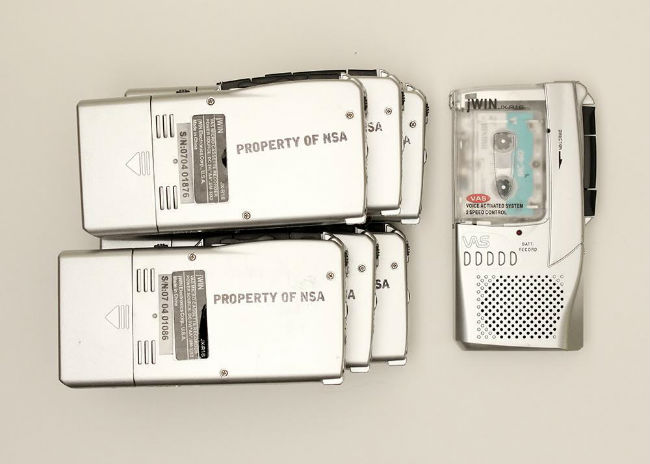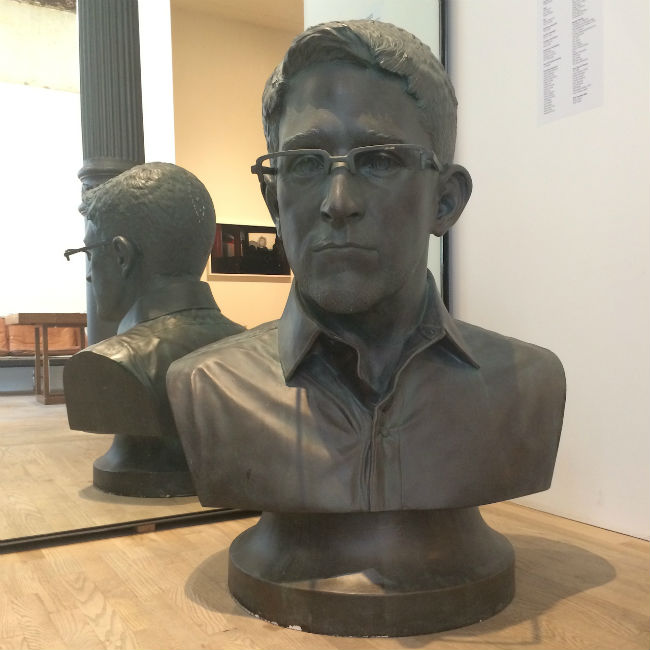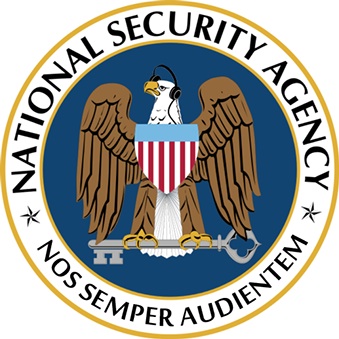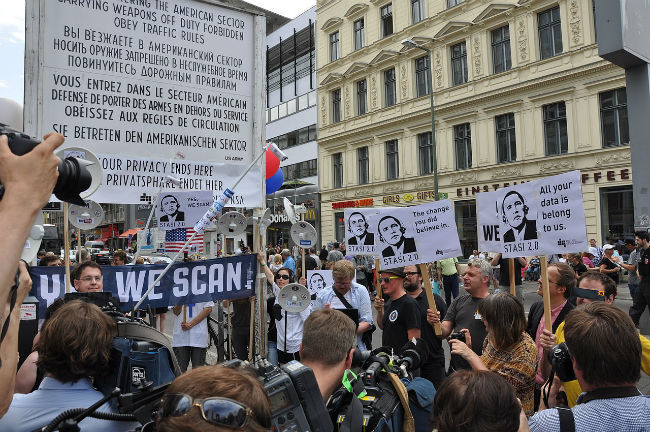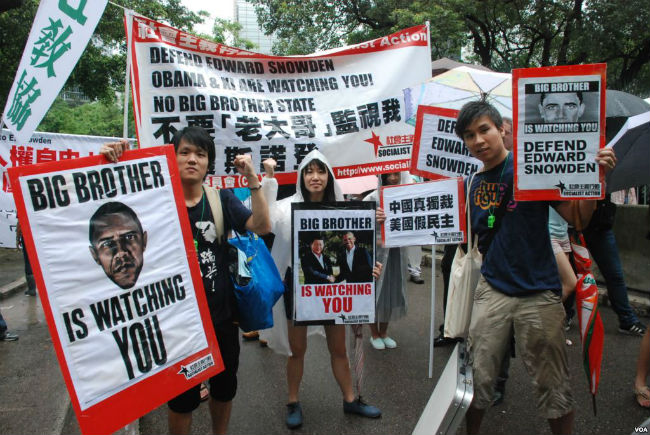Artists Blow the Whistle on Their NSA Whistleblower Project
Tape recorders used for Jeff Greenspan and Andrew Tider’s “We Are Always Listening” project (2015)
(courtesy the artists)
On Friday artists Jeff Greenspan and Andrew Tider walked away from We Are Always Listening (WAAL), a National Security Agency (NSA) subcontractor, DIY surveillance program, satirical prank, or new media art project, depending on your interpretation. The artists, who anonymously scored a viral hit earlier this year when they clandestinely installed their sculpture bust of NSA whistleblower Edward Snowden in a Brooklyn park, secretly taped the conversations of strangers in New York and Berlin and posted the audio files online.
The project fulfilled Greenspan and Tider’s goal, which was to rekindle the widespread anger about unchecked and unauthorized government surveillance of citizens that flared in 2013 at the time of the NSA leaks. News outlets on both sides of the Atlantic covered WAAL — from Gothamist and Wired to the Guardian and Spiegel — fueling further outrage over its invasive nature, which the artists sought to redirect (via the “Angry?” link on the project website) toward an American Civil Liberties Union petition in the lead-up to the expiration of the Patriot Act on June 1. But after a long conversation with another NSA whistleblower, Thomas Drake, the artists reevaluated and ultimately decided to pull the plug (or blow the whistle) on their project.
Hyperallergic spoke to Greenspan and Tider about their reasons for starting WAAL, why they think the public was so quick to stop caring about the NSA surveillance scandal, and how activists and artists have to compete with everything from the economic crisis in Greece to Miley Cyrus for people’s attention.
Jeff Greenspan and Andrew Tider, “Prison Ship Martyrs’ Monument 2.0″ (2015) at Postmasters Gallery,
where it is currently on view. (photo by the author for Hyperallerhic)
Benjamin Sutton: Could you explain the impetus for this project? What inspired you to start We Are Always Listening?
Andrew Tider: The reason we started this is because we felt like the report on terror was critically important. The NSA has the ability to listen to the actual content of your phone calls. A lot of people don’t know that. But they have to go to a special court in order to do this, and the court basically says yes — they issue a warrant for that activity in 99.7% of cases. But there’s that .3% of cases where they don’t get a warrant so they can’t listen to your phone calls. So we just wanted to help pick up the slack for that critical .3%. That was part of the inspiration for the project.
Jeff Greenspan: And the other part was that even the most mundane conversations, everyday conversations of everyday Americans may be of interest to the NSA, and we wondered: where are there more of these mundane conversations happening? Coffee shops, yogurt shops, restaurants, galleries. So we figured this was a great way to pick up these pieces that were being lost in the wide net that’s being cast across American conversation. We were always aware that the NSA’s actions, and in turn our actions, were fairly controversial. Some people object to this type of surveillance, and the whole idea of what can be done to protect American freedom and American ideals. A cornerstone of those ideals and those freedoms are the ability to show dissent, the ability to speak truth to power, and the ability to disagree with those who are in charge.
So in the spirit of that type of freedom that we’re trying to protect, we always put a link on our site, wearealwayslistening.com, that says “Angry?” If you were angry about this type of surveillance, you could go to an ACLU action page and let your local representatives know your disdain for these measures. And we thought this was an especially vital time for people who did feel that way to speak up because it was leading up to the sunsetting of Section 215 of the Patriot Act, which eventually did sunset and has now been replaced with the USA Freedom Act, which hasn’t in any real substantial way changed the data collection of this country. To get the actual content of conversations you needed to go to a special court that operates in secret and grants warrants in almost 100% of cases. Now the difference is, with the USA Freedom Act, the court has to publish once a year how many times they’ve actually given this approval. And the other big difference, if you want to call it a difference, is that the government can no longer directly collect the metadata from the surveillance. They have to go to the phone companies or the ISPs to get that.
BS: And why did WAAL take the particular form it did? Why did you decide to supplement the NSA’s surveillance activities as a way of criticizing them?
We Are Always Listening’s modified NSA logo (courtesy the artists)
AT: We were hearing a lot of people say, in relation to privacy and surveillance, “I’m not doing anything wrong and so I don’t care if the government is spying on me and other citizens.” That was really bothering us, and I’ve heard a lot of people talk about this, and I think Glenn Greenwald has a really salient point about it — he did a TED talk that’s pretty amazing, but one of his main points, which is something that I’m pretty confident we both agree on, is the idea that it’s not really about whether you’re doing something wrong, it’s about the fact that if you know you’re being constantly monitored, then it limits you. Whether or not you realize it your behavior is limited. One of the examples he gives is, if you like to sing in the shower, you feel comfortable, you’re going to sing, it doesn’t matter if your voice is good or not. But if you knew that someone was audio and/or video recording you sing, you might not sing at all.
JG: Or you might not sing Taylor Swift.
AT: It’s not because you’re doing anything illegal or bad, it’s just the nature of being watched when you don’t need to be watched. And that’s one of the points we were trying to make.
JG: And it’s not just the government that has this information, it’s also third-party contractors. Edward Snowden didn’t work directly for the NSA, he worked for a contractor, so how do these contractors that the NSA is sharing this information with, what are they doing with this information? And, an example we use is, through listening to your conversation someone could find out, let’s say, that you’re gay. In many, many states you can be fired for being gay. So when people say they’re not doing anything wrong, or doing anything illegal, what’s considered wrong, what’s considered illegal, and what’s considered acceptable slides, and it’s dependent on who’s in power at the time. And who knows how long this information is being held onto by the NSA or by third-party contractors. For WAAL, we deleted our information pretty quickly. Had we been a larger surveillance unit, with larger server space and more resources available to us, we could’ve held onto this content in perpetuity. Who knows what will be socially or legally acceptable 10, 20, 30 years from now?
It’s very easy for surveillance to become an abstract concept. It’s funny, when we’ve talked to people, even some friends who know that we did the project, they would joke “oh, should I look under the table to see if there’s a recorder here?” You should think that way all the time, because there is always a recorder on you. Whether it be a video camera, or whether it’s access to the cameras on your laptop or your phone, or whether it just be information about who you called when and where and how often, and the coordinates of your physical location through your phone. Those things are being collected and data-mined and harvested and it’s much more invasive than a crappy, almost antiquated voice recorder hidden under a table. So we wanted to make the abstract personal and then be a lightning rod for people’s anger, and then if you got angry at us well then we could very easily direct your anger over to your local congressman who can actually effect change and impact how surveillance is conducted in this country.
BS: Why did you use these very old-school tape recorders for the project, as opposed to more sophisticated devices?
JG: We chose these because there’s a sense of theater to it, it’s a good theatrical prop. Of course the NSA is using much more sophisticated means. Andy and I could have gone to a spy shop and gotten even more clandestine in our recording, but we wanted to kind of temper the seriousness of it with a little bit of theatrical humor to get people to be able to embrace it.
AT: I think we wanted to balance the level of fear that somebody should have. We knew that this was going to be somewhat controversial, we were definitely going above and beyond to not release anything that could really materially hurt someone. We were collecting — not on purpose — people’s bank account numbers, social security numbers, all kinds of information that you certainly wouldn’t want out there. We deleted all that information. I think we were trying to strike a balance between spooking people and really scaring the shit out of people. We wanted people to get the joke but at the same time be a little bit upset.
An anti-NSA protest in Berlin in 2013. (photo by Digitale Gesellschaft, via Wikimedia)
JG: There’s another parallel that I think was drawn between the NSA and by us using the old tape recorders. There’s a real inefficiency in the NSA, there’s a real sense of throwing money and resources at things that are kind of ridiculous and missing the point, and a lot of that has been brought to light by Thomas Drake, who was an NSA whistleblower who we had a very lengthy conversation with on the telephone. There’s a great example Thomas Drake had: he proposed a program, it would have cost $3–4 million and been an efficient, streamlined program, and instead the NSA opted for a $3-billion program, which didn’t work, and had the more efficient, streamlined, and cost-effective program been implemented, it looks as if the hijackers behind 9/11 would’ve been caught.
So here’s a great example of a lot of money being used toward a cumbersome, inefficient, gargantuan program that isn’t really working as well as it could. And that’s kind of what our recorders are: they’re much bigger than they need to be, they’re really not that efficient, they only record like 30 minutes at a time, they’re kind of antiquated and not at all streamlined. It’s almost like a Keystone Cop — it’s a little silly, it’s ridiculous, and there was a little bit of mocking the NSA while we’re also purporting to work for them, and we thought that that kind of device really captured that.
BS: You’ve talked about this pervasive feeling of not being implicated in NSA surveillance — the “I’m not doing anything illegal, so I don’t care” argument — but do you think there are there other forces behind the widespread apathy regarding government spy programs?
AT: I think on a very high level, it’s a really scary thing to think that your country and your government could be doing something against you, particularly in the United States where, at least for people who were born and raised here, in most schooling environments, we were really taught this of narrative of “The United States can do no wrong, the United States is wonderful, and we’re peace-keeping, and we’re trying to make the world great.” And in a lot of ways that’s really true, but there are other narratives that many people could write about the United States that are very different.
Have you ever seen the movie They Live? So, in the scene where he’s trying to get his friend to wear the sunglasses, to see the truth, the reason he has to try so hard that it becomes a fight is because it’s painful to try to get somebody to see the truth, and I think that’s applicable here. For you to examine the fact that your country and your government could be doing something like spying on you is such a horrifying thought, because if your country — which you were taught and grew up believing was this wonderful thing that takes care of you and takes care of the world — if they are potentially doing something wrong or even evil, then who’s left to be good in the world? That’s so terrifying, and it’s so big, that it’s really hard to wrap your head around it. And if you are willing to face it, it seems like such an insurmountable problem.
Pro-Snowden, anti-surveillance demonstrators at a 2013 rally in Honk Kong. (photo by VOA, via Wikimedia)
JG: I don’t want to sound conspiratorial, but I think that we live inside of a culture that is awash in a sea of media, and I think that the media for the most part — either consciously or subconsciously, or by design or by default — the end result is a massive amount of content that trivializes the important and makes the trivial important, because that makes good consumers.
It narrows the range of expression, curiosity, discourse, and that lets you control the narrative. Now, if you want to talk about whether the media’s in cahoots with the government and religion, that’s a whole other story, but on the baseline level, why are these stories not on TV? Because Miley Cyrus is a much more interesting story, it’s a more palatable story. I’m just using that as a placeholder for any story of the day. So it’s hard to really latch onto the things that really need to be picked apart, and it seems in the culture that we’re living in now, the only ones who are really doing that in a way where they’re really picking apart and doing it in a way that people can give it the type of attention it needs, is The Daily Show, The Colbert Report — which is off the air now — or John Oliver. And these are akin to the jesters from the days of kings and queens, when they were the ones who could really tell the truth.
So when we think these things through as people whose day jobs are working in advertising, working in branding, and we work to put human expression on human-less companies, these are corporations that we’re trying to create narratives that people can believe, these are the new myths — Pepsi, Coke, Chevrolet, Dove soap, Nike. So we thought, “is there a way to do what we do, can we take the things that we’ve learned in, collectively, our 30 years in the business, and use them to promote ideas or discussions we think are important?” That’s how we came up with projects like this.
How can you create something that breaks through the feed of Facebook and Twitter and gets in the press, that gets people talking about it? We’re really happy that the press and even conversations we’ve overheard about this project have all cycled toward: “well, I see why they’re doing it, maybe we should pay more attention, maybe we should be more conscious.” But there are many more steps between people being aware and people taking action. These things don’t happen overnight, but you have to start somewhere.
AT: Jeff turned me onto Abbie Hoffman, and I remember you saying, Jeff, “if you want to have a revolution, you have to make it more fun.” And I think that applies very much here. You gotta grab people, because you’re not really competing with some brief from the Pentagon that no one’s gonna pay attention to anyway, you’re competing with Miley Cyrus sticking her tongue out. So you have to be as interesting or controversial or exciting or funny as that.
